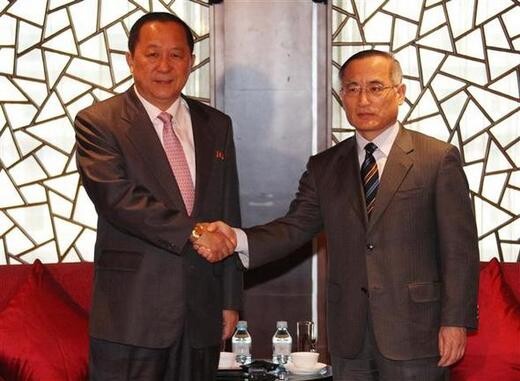hankyoreh
Links to other country sites 다른 나라 사이트 링크
Inter-Korean talks set stage for N.Korea-U.S. bilateral talks

By Son Won-je, Staff Writer
A second round of inter-Korean denuclearization talks ended Wednesday without any clear results. Observers are now saying the question of whether the six-party talks on the North Korean nuclear issue resumes depends on additional dialogue between Pyongyang and Washington, which is expected to take place in mid-October.
The inter-Korean talks that took place, however, effectively met the conditions for another round of North Korea-U.S. dialogue. Washington presented Pyongyang with three conditions for continuing with dialogue after a first round in New York in July, among them providing a clear answer on “preliminary denuclearization steps” by ending its uranium enrichment program (UEP) and halting nuclear tests and missile launches, and taking part in a second round of inter-Korean denuclearization talks. In agreeing to the second inter-Korean talks, Pyongyang also proposed follow-up dialogue with Washington, an indication that it has an answer ready for U.S. concerns about its nuclear program and missiles.
The second Pyongyang-Washington talks are expected to take place in mid-October, taking into account the time needed for preparations. The two countries are known to be seeking an outside venue for the dialogue rather than New York or Pyongyang, such as previous dialogue site Singapore, Berlin, or Geneva. A senior South Korean government official said Thursday that while North Korea wants the follow-up dialogue to be held in Pyongyang, since the first round took place in New York, Washington has been strongly against that idea.
Analysts said North Korea appeared to hint at the response it would give in a second round of dialogue with Washington during the second inter-Korean talks.
“North Korea talked a lot about preliminary denuclearization steps, making us think we could see some progress if we work together,” said a South Korean senior government official. “North Korea may end up saying more to the United States.”
While North Korea did not offer any clear pledge on “preliminary denuclearization steps” during the inter-Korean talks, some analysts say it hinted that it might express a more advanced approach in dialogue with Washington.
If North Korea does declare its intent to take such steps at its dialogue with Washington, there is a strong chance the push to resume the six-party talks could gain momentum.
A foreign affairs source said, “If that happens, it is not out of the question for the six-party talks to resume within the year.”
But with a large difference in views between Pyongyang and Washington over the halting its UEP, a major bone of contention in the “preliminary denuclearization steps,” many are expressing skepticism about the chances of the two finding common ground in just two rounds of dialogue. The plan from Seoul is to continue working to change Pyongyang’s stance by carrying out additional rounds of inter-Korean talks in parallel with Pyongyang-Washington dialogue.
After the close of the talks Wednesday, the North Korean and South Korean senior representatives, respectively Special Representative for Korean Peninsula Peace and Security Affairs Wi Sung-lac and Vice Foreign Minister Ri Yong-ho, met individually Thursday morning and afternoon with the Chinese senior representative to the six-party talks, special representative for Korean Peninsula affairs Wu Dawei, to explain the outcome of the talks and share opinions on the future dialogue process.
Please direct questions or comments to [englishhani@hani.co.kr]
Editorial・opinion
![[Guest essay] The real reason Korea’s new right wants to dub Rhee a founding father [Guest essay] The real reason Korea’s new right wants to dub Rhee a founding father](https://flexible.img.hani.co.kr/flexible/normal/500/300/imgdb/original/2024/0423/8317138574257878.jpg) [Guest essay] The real reason Korea’s new right wants to dub Rhee a founding father
[Guest essay] The real reason Korea’s new right wants to dub Rhee a founding father![[Column] ‘Choson’: Is it time we start referring to N. Korea in its own terms? [Column] ‘Choson’: Is it time we start referring to N. Korea in its own terms?](https://flexible.img.hani.co.kr/flexible/normal/500/300/imgdb/original/2024/0423/3617138579390322.jpg) [Column] ‘Choson’: Is it time we start referring to N. Korea in its own terms?
[Column] ‘Choson’: Is it time we start referring to N. Korea in its own terms?- [Editorial] Japan’s rewriting of history with Korea has gone too far
- [Column] The president’s questionable capacity for dialogue
- [Column] Are chaebol firms just pizza pies for families to divvy up as they please?
- [Column] Has Korea, too, crossed the Rubicon on China?
- [Correspondent’s column] In Japan’s alliance with US, echoes of its past alliances with UK
- [Editorial] Does Yoon think the Korean public is wrong?
- [Editorial] As it bolsters its alliance with US, Japan must be accountable for past
- [Guest essay] Amending the Constitution is Yoon’s key to leaving office in public’s good graces
Most viewed articles
- 1[Column] ‘Choson’: Is it time we start referring to N. Korea in its own terms?
- 2Senior doctors cut hours, prepare to resign as government refuses to scrap medical reform plan
- 3[Guest essay] The real reason Korea’s new right wants to dub Rhee a founding father
- 4Why Korea shouldn’t welcome Japan’s newly beefed up defense cooperation with US
- 5Opposition calls Yoon’s chief of staff appointment a ‘slap in the face’
- 6New AI-based translation tools make their way into everyday life in Korea
- 7Terry Anderson, AP reporter who informed world of massacre in Gwangju, dies at 76
- 8[Column] The clock is ticking for Korea’s first lady
- 9Samsung barricades office as unionized workers strike for better conditions
- 10Korean government’s compromise plan for medical reform swiftly rejected by doctors